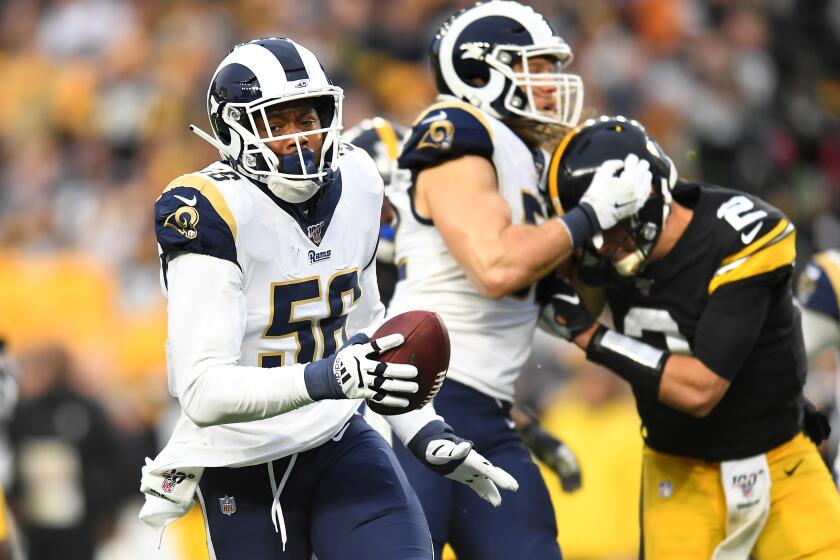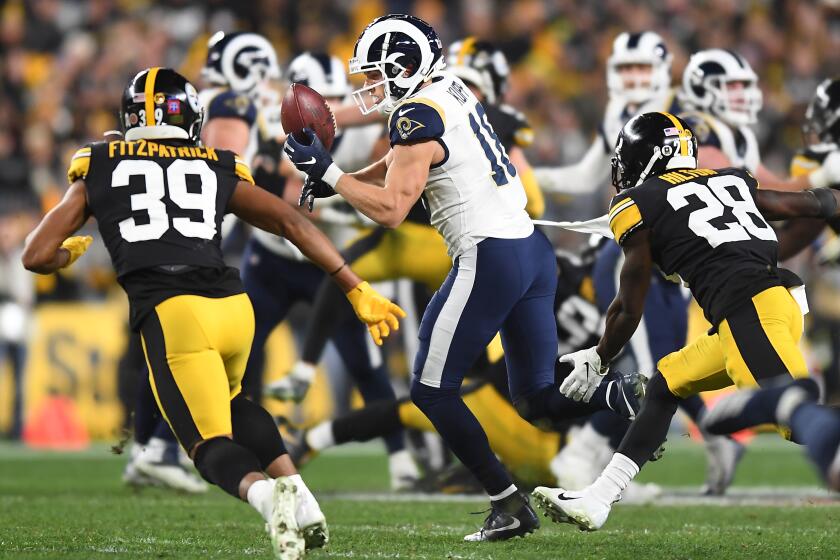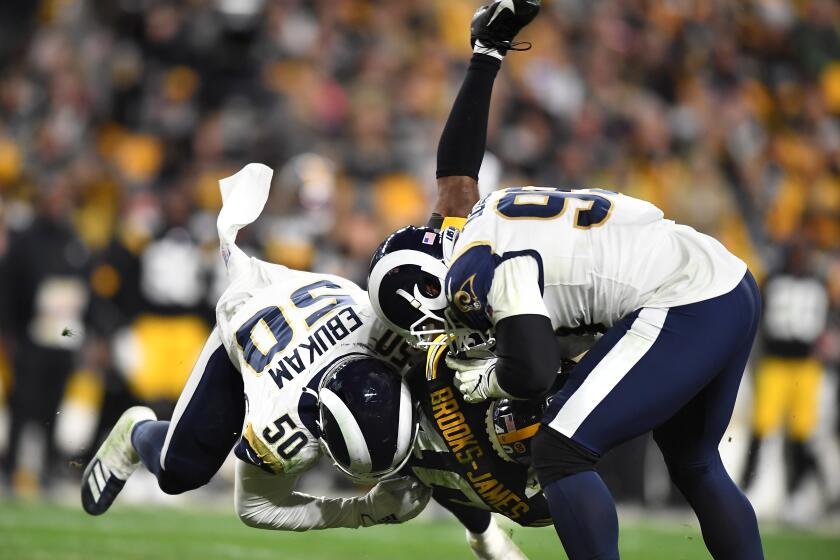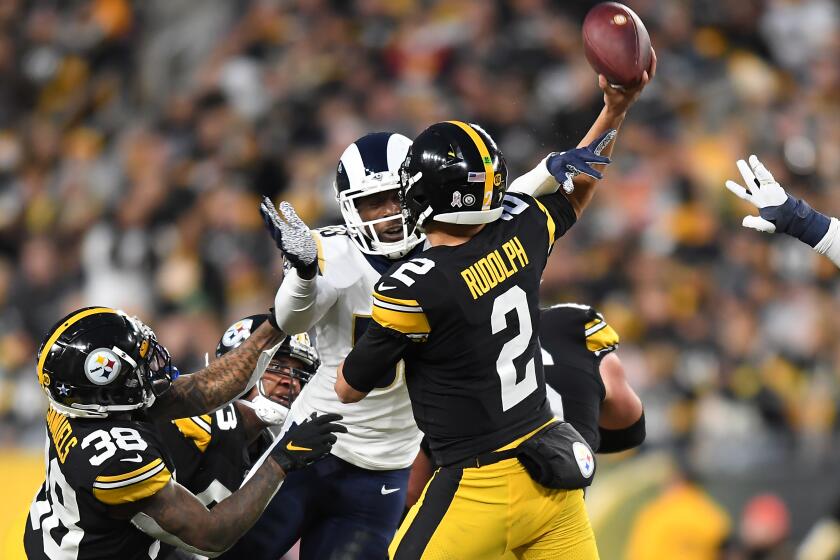More injuries on offensive line has Rams scrambling to fill holes in loss to Steelers
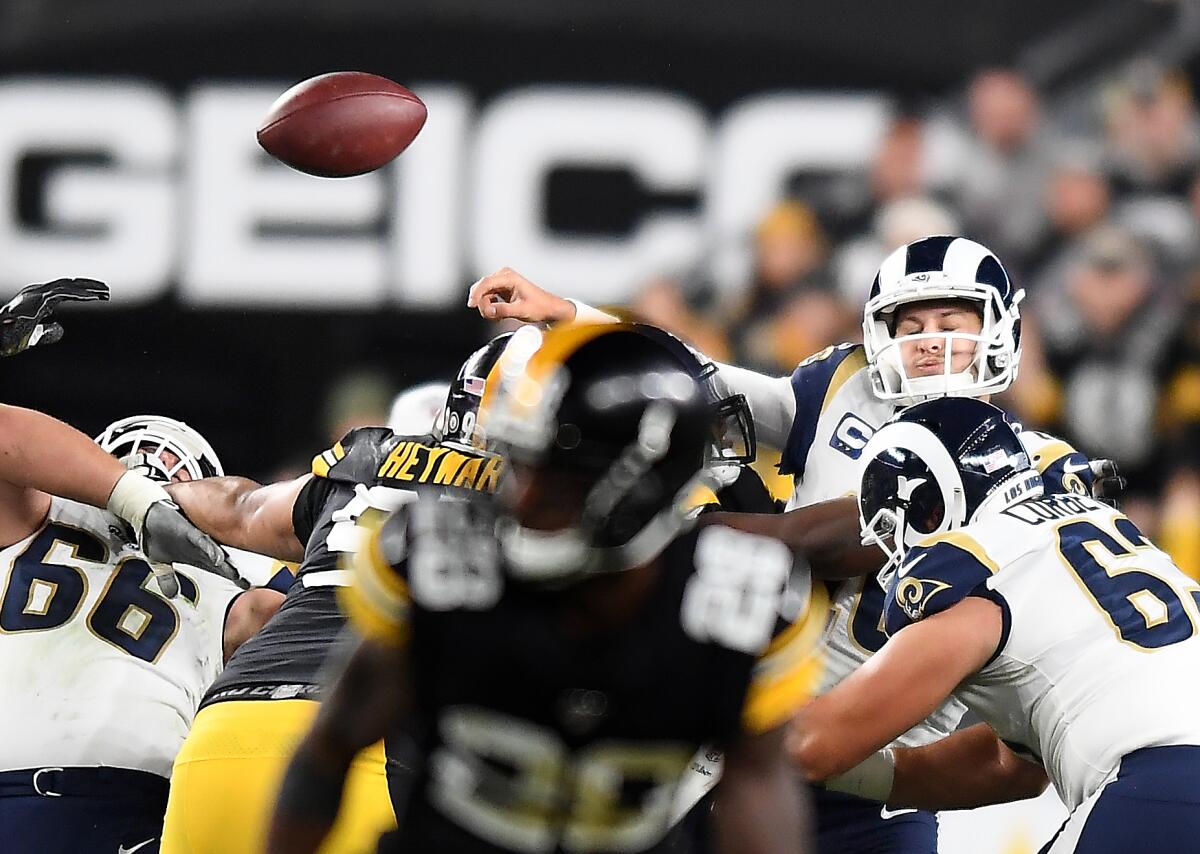
- Share via
PITTSBURGH — The foundation of the Rams’ attack for the past two years, the bedrock on which a playoff team and a Super Bowl team were built, has been reduced to a soap opera of sorts: “As the Offensive Line Turns … Over.”
Continuity was the strength of the line in 2017 and 2018, when the same group played every week with the exception of a few late-season games in which coach Sean McVay rested starters.
It was center John Sullivan, guards Rodger Saffold and Jamon Brown and tackles Andrew Whitworth and Rob Havenstein in 2017. There was only one change in 2018, when Austin Blythe replaced Brown.
The release of the aging Sullivan and a series of injuries forced more of a revolving-door approach this season, and the line crumbled under the weight of the upheaval in Sunday’s 17-12 loss to the Pittsburgh Steelers at Heinz Field.
While the Rams defense was dominant for much of the game, contributing a touchdown on Dante Fowler’s 26-yard scoop-and-score in the first quarter and a safety on an end zone sack of Pittsburgh quarterback Mason Rudolph by Aaron Donald and Clay Mathews in the fourth, the offense sputtered.
Quarterback Jared Goff, often under heavy pressure, was sacked four times for a loss of 25 yards, absorbed five other hits and had two interceptions. Of the Rams’ 10 penalties, which cost them 95 yards, five were committed by offensive linemen for 40 yards and stunted several drives. The Rams converted one of 14 third-down plays.
The Rams’ 17-12 loss to the Steelers dropped their record to 5-4, ruined a homecoming for star Aaron Donald and put the Rams season on verge of collapse.
“We let the defense down today — that’s the bottom line,” said Blythe, who moved from right guard to center after Brian Allen suffered a knee injury early in the second quarter and didn’t return. “It’s very frustrating.
“The defense played lights out. They gave us every opportunity to seize control of the game and to win the game, even at the end there. That’s all we can ask of the defense. We just didn’t get it done today.”
The line was a work in progress before Sunday. Left guard Joe Noteboom suffered a season-ending knee injury in Week 6 against San Francisco. When his replacement, Jamil Demby, struggled, the Rams moved rookie David Edwards to left guard for the Oct. 27 game against Cincinnati.
Then things went a little haywire Sunday. McVay moved Edwards, a fifth-round pick out of Wisconsin last April, to right guard and Blythe to left guard during their week off, because Edwards played on the right side in college.
When Blythe moved to center in the second quarter, Austin Corbett, a second-round pick by the Cleveland Browns in 2018, entered at left guard, making his Rams debut.
When Havenstein departed because of a knee injury late in the fourth quarter, Coleman Shelton, an undrafted free agent from Washington, entered at right guard, moving Edwards to right tackle.
“A lot of moving parts,” McVay said. “No matter how you cut it, we have to figure out a way to get it done.”
Goff did complete 22 of 41 passes for 243 yards, and Todd Gurley rushed 12 times for 73 yards, but Goff, who lacks the mobility to extend many plays with his feet, had little time to operate against a swarming Steelers defense.
Usually explosive Rams produce a field goal on offense, and squander a defensive effort that included a fumble return for a TD and a safety in loss to Steelers.
Pittsburgh tackle Cameron Heyward bull-rushed Blythe and dropped Goff for a 10-yard loss on a third-and-eight play to start the second quarter. Linebacker T.J. Watt submarined under Havenstein and sacked Goff for an eight-yard loss on a second-and-nine play late in the second quarter.
Steelers nose tackle Javon Hargrave hit Goff’s arm, forcing a fumble that Minkah Fitzpatrick returned 43 yards for a touchdown and a 14-7 lead with 1 minute 44 seconds left in the second quarter.
An Edwards holding penalty just before halftime forced a third-and-20 play at Pittsburgh’s 49-yard line. Goff threw 13 yards to Robert Woods, but Greg Zuerlein’s 56-yard field goal attempt was wide left as the first-half clock expired.
“Any time you have new guys in there, young guys who haven’t played … you’re kind of learning on the run, learning on the fly,” said Whitworth, a 14-year veteran. “And then when the center goes down in the middle of the game, that’s a massive blow.
“That’s where all the communication, the timing comes from. It would be one thing if you were home and in normal cadence, but when you’re on silent [snap] … the center is the commander of the group, and that makes it a challenge.”
Cooper Kupp went into Sunday’s game as the Rams’ leading receiver, a player who amassed 225 yards in his last game and ranked as the NFL’s top third-down target. He did not catch a pass against the Pittsburgh Steelers.
Goff said the disruptions along the line changed “the overall jelling and chemistry” of the group, and McVay acknowledged that the line’s struggles changed his play-calling. The Rams mixed in a few more short out patterns, quick slants, screen passes and draw plays with limited success.
“It kind of gets you rattled,” Whitworth said of Sunday’s turnover on the line. “You’ve got to be able to convert some third downs early in the game, which we weren’t, and then you start turning the football over. Any time you do that, you’re going to be in trouble.”
Rams’ 17-12 loss to the Pittsburgh Steelers by the numbers
More to Read
Go beyond the scoreboard
Get the latest on L.A.'s teams in the daily Sports Report newsletter.
You may occasionally receive promotional content from the Los Angeles Times.

